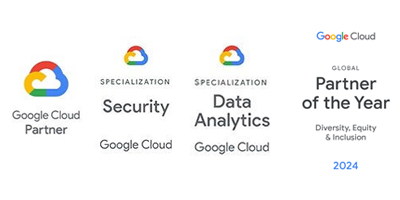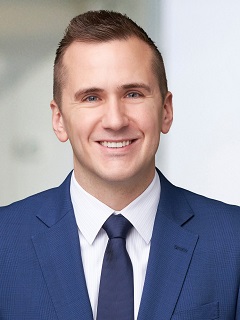Video Transcript
Confronting the obstacles of digital transformation in healthcare
Amy Czech
Hi, my name is Amy Czech and I am the senior Alliance Director responsible for KPMG's Google Cloud Alliance relationship. I've invited two of my colleagues to speak with us today about how we at KPMG have been helping our healthcare clients to overcome the challenges of digital transformation with Google Cloud.
Mike Krajecki is a partner at KPMG leading digital health technology and innovation. Mike works with our clients to define their strategy and deliver transformation solutions to change the way clients run their business and deliver patient care.
Randall Walker is a director for data and cloud engineering focused on the front lines of digital transformation.
The first topic we wanted to discuss today is data and AI. In all industries, getting access to data is critical. But in the realm of healthcare, getting access to the right data can have a critical impact on the quality of care. Mike, can you talk a bit about key trends and some of the key issues around data in healthcare and what role you see Google Cloud playing in this landscape?
Mike Krajecki
Yeah, absolutely. Thanks, Amy. One of the most ultimate value propositions of the cloud is this concept of unlocking data. So much of healthcare data is currently constrained in silos and monolithic systems and legacy platforms. It doesn't communicate well across those systems and it's this mixture of unstructured and structured data, transactional data, sensory data and complex imagery.
The native solutions and capabilities from Google Cloud platform offer many ways that a health provider can actually accelerate their data innovation programs and that's why establishing a data foundations is such a critical part of any cloud transformation journey.
The benefits are really clear. You're able to get your data into a common platform that breaks down traditional barriers. You can open up data to broader user communities and actually create new datasets and new value as a result of that. And most importantly, the native artificial intelligence and machine learning capabilities that Google provides are truly leading class and they're constantly improving over time and they're giving health systems ways to really innovate with their data that has the ability to impact patients, providers and hospital operation.
Amy Czech
Randall, I know you've built some great solutions on GCP taking advantage of these capabilities. Can you share with us a few examples of what you've built in Google Cloud?
Randall Walker
Sure. Thanks, Mike. Two projects immediately come to mind. One where we work with the renowned university hospital that wanted to harness predictive analytics to get a lead on emerging symptoms among ICU patients. We work with the client and Google to bring in that real-time ICU data into their Google Cloud project. We use the cloud healthcare API that Google has to transform the HL7 data from the ICU beds into the interoperable FHIR format that their predictive analytics engine used.
We also set up a transformation and migration hub on premise to help obfuscate and mask some of the more sensitive data for the model to ingest. Once this was deployed, the hospital staff was then able to gain several hours of advanced notice before these symptoms would typically appear and give them a headstart that would mean the difference between life and death for some of these patients.
Another project we worked on was to enable faster and more efficient DICOM de-identification for third party clinical trials. We worked to set up a GCP DICOM adapter, and also Google's healthcare API to feed in these dotcom studies and de-identify the metadata within them, and then silo out the studies based on the third party requirements in the Google Cloud Project. This also had the added benefit of giving hospital staff more time to do what really matters, and that's taking care of patients.
Amy Czech
Thank you, Randall. That's really helpful. One of the other topics that we wanted to talk about today was around security. Information security, data security and security of the cloud really is a critical component of all digital transformation. Mike, can you speak a bit about how KPMG is integrating security into our digital transformation approach in healthcare?
Mike Krajecki
As you just heard from Randall, he mentioned security and data protection a number of times, and that's a great example of how we embed security into every project that we perform within healthcare. Cyber security and data protection needs to be front and center of any technology initiative. We believe that adopting GCP as part of your IT estate is actually a great way to enhance your security posture and help you modernize a lot of your security processes.
One of the first steps that we help our clients take when investing in the cloud is to build their cloud foundations. It's also called a landing zone. This is literally that baseline setup, the organizational structure, the infrastructure, the networking, those security policies and configurations. And you do all this so you can confidently build new products and migrate existing workloads into the cloud, knowing that they're all centered on a very strong, secure foundation.
If done correctly, it can really open up new security capabilities that a health provider's InfoSec and cyber team currently leverage. Trends like Policy-as-Code and DevSecOps will allow a security function actually to operate at modern speeds and keep up with business demands. When they're partnering with Google, you gain the capabilities of an organization that has literally invested billions of dollars in their security capabilities and offerings and you can adopt those into your own program.
Randall, you and I maybe aren't day-to-day security professionals, but all of our cloud engineering projects do involve security. Can you talk about how we partner with our cyber professionals and how we build security into all of our engineering projects?
Randall Walker
Sure. When it comes to security, we look at it from all different angles, starting from what is the current state of the security in relation to our clients' Google Cloud platform? Is it public? Is it VPN? Is there interconnect when it comes to connecting to their on-premise? Are there third party network applications and security services that are currently serving them that we want to duplicate in GCP? How is the identity access management established in relationship to their active directory? Understanding their current state.
And then, as we build out their Google Cloud project, we look at the resource hierarchy. We try to really separate and build that hierarchy out as it pertains to security. Then finally, we really look to leverage Google Cloud zone services for enacting these security policies. We have things like Key Management Services, Google's Kubernetes Engine, Cloud Monitoring, Cloud Security Scanners, even additional applications like Forseti, which also work in Google Cloud to enhance their security features. From a top-down, bottom-up, we try to infuse security in every step of the way.
Amy Czech
Perfect. Thank you. Thank you, Randall and Mike. I think it's helpful to understand how we've started putting this into practice for some of our clients. The last topic we wanted to cover was around the importance of modernizing IT operations. And Mike, maybe you can speak a little bit about why modernization around IT operations is such a critical element of healthcare innovation.
Mike Krajecki
Most of our leading health provider clients have established some form of a guiding principles or a North Star vision, if you will, on how they're going to improve patient outcomes, patient experiences, physician experiences and overall hospital operational efficiencies. To enable those programs, they need a modern technology stack behind it to really accelerate those programs forward. Cloud is a core component of modern IT operations. It's not the only component though, as there's so many other IT initiatives across people, process and technology that must move forward to embrace that true North Star vision.
Let me provide you a couple examples here. If you're going to be migrating your IT estate into the cloud, you'll think about the other business priorities you can help move ahead. Things like getting rid of data centers or reducing satellite, kind of data closets, if you will. You can also take this as an opportunity to reduce tool duplication, manage licenses for software you move into the cloud. Network segmentation is a huge topic in healthcare. How can we migrate apps that are currently in spider web, non-segmented networks and move them into carefully segmented networks in the cloud?
The same thing could be said of your backup and recovery strategy. Moving into cloud with native multi-zone, multi-region resilience can really enhance your capabilities at a lower cost point than your current BCDR strategy. If planned correctly, your migration into the cloud can really enable so many other IT modernization initiatives.
To me, it's all about having a top-down strategy and really thinking across your lines of business, your front, middle and back office and how cloud can benefit your organization and being able to prioritize those initiatives and determine how to scale them over time. That's really the way that you can take advantage and really attain a true return on your cloud investment.
Amy Czech
Well, thank you so much, Mike and Randall, for sharing a bit about your experience. We at KPMG are really excited to help engage with our clients and with you around how to help drive innovation in healthcare.





